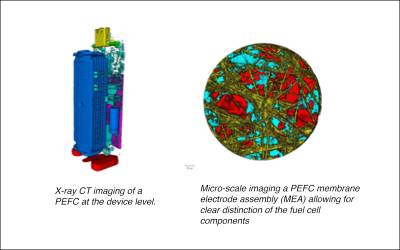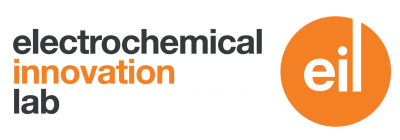Background

Jennifer was born in Glasgow, but grew up in Stockport in South Manchester. In 2015, she graduated from Durham Unversity with a first class honours MChem in Chemistry. As part of her degree, she carried out her final year research project at the Universtiy of Würzburg in Germany.
Jennifer's interest for electrochemical energy devices arose during the summer research project she carried out at the Institut Laue‑Langevin (ILL), in Grenoble, France in 2014, in which she was using computational chemistry to investigate ion conduction in solid oxide fuel cell (SOFCs) materials.
After taking a year out following graduation to spend in the mountains of Austria, Jennifer returned to the UK in September 2015 to start her PhD as part of the CDT in Advanced Characterisation of Materials. She is based mainly at the Electrochemical Innovation Lab (EIL), but also carries out part of her research in the Prof. Nigel Brandon group at Imperial College London.
Research Summary
Title: Multi-scale characterisation of polymer electrolyte fuel cells (PEFCs)
Combining her interests in alternative energy and materials characterisation, Jennifer's project aims to elucidate the material degradation and defect formation in PEFCs. Over the course of her PhD, she will use a variety of state‑of‑the‑art characterisation techniques to correlate the electrochemical properties of PEFCs to their microstructural features.
A multiscale characterisation approach will allow for a rigorous study of the function of PEFCs under practical operating conditions. Electrochemical analysis techniques, like electrochemical impedance spectroscopy (EIS), polarisation curves and cyclic voltammetry (CV), will give an understanding of fuel cell performance.
Advanced imaging techniques, including X‑ray computed tomography (X‑ray CT), electrochemical atomic force microscopy (EC‑AFM) and focused ion beam/scanning electron microscopy (FIB‑SEM), will provide a unique insight into the fuel cell components, such as the electrodes and polymeric membrane, from the micro‑ down to the nano‑scale.
Jennifer will use the unique suite of instruments available both at UCL and Imperial to carry out her work. The use of complementary techniques will enable a thorough understanding of the material changes that occur during PEFC operation across multiple length scales.
X‑ray CT is a particularly attractive technique for PEFC characterisation, due to its non‑destructive nature. Because the chemistry of PEFCs occurs at the interface between layers, it has often proven challenging to image these surfaces without complete destruction of the sample. X‑ray CT, therefore, proves itself to be an extremely useful technique for allowing insight into the internal workings, without the need for complete sample destruction, as is the case with many other post‑mortem analysis techniques.

 Close
Close



